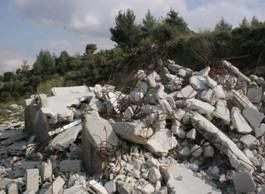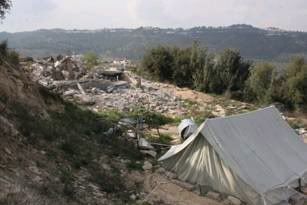Nothing in the West Bank (and earlier in Gaza) is more symbolic of Israel’s colonialism than house demolition. The Israel Committee Against House Demolition (ICAHD) estimates that military bulldozers demolished more than 16,000 Palestinian homes since Israel took occupation of the Palestinian territories in 1967, and it continues today. Israel’s Defense Forces (IDF), of course, never left. To the contrary, all Israeli governments since 1967 approved settlement of the territories, which, contrary to international law, was made possible and forcefully supported by the IDF, their only reason for remaining in the West Bank. The total effect of this colonialism is that Israel now controls almost half of the West Bank on which sit over 150 Israeli only villages, towns, and cities, some exceeding 30,000 in population, industries and agribusinesses, a large network of Israeli only roads and highways connecting these towns and cities to Israel, and all of the water aquifers and resources.
Israeli has pretty much exploited the West Bank for all it is worth.
Here is a typical story of how Israel comes to confiscate privately owned lands on the West Bank. If it sounds Orwellian, it is only because it probably is.
The Salim Family from Walija, a village near Bethlehem owned a plot of land that was 800 square meters in size, inherited from the mother’s side of the family. In 2004, Mr. Munther Salim, who continues to work as a laborer, began building a house approximately 100 square meters for his five family members. On July 2005, the Israeli Defense Forces (IDF) and Israeli police came to the location and gave the family the first home demolition warning. Mr. Munther refused to take the warning and tore the papers claiming that this is his land an that Israeli had nothing to do there and not even the right to give him any warnings, the IDF forces left and he summoned to go to the Israeli court.
Mr. Munther went to court several times; the first time Israeli government asked him to pay a penalty of 6,000 shekel (almost $1,500 USD) because he refused to accept the demolition warning. He was told in court that the land belongs to the Jerusalem municipal district and he should get permission to build from the Jerusalem Municipality. It is important to note that other houses in the same area received their permits from the Walajeh Village council. The lawyer succeeded in postponing the demolition orders.
On January 31st 2006 an Israeli demolition crew, accompanied by bulldozers and dozens of soldiers and police, suddenly arrived to the location. Within an hour the house was reduced to rubble after they the family was forced out. The family did not give up; a month later they began building the house for the second time. The Israeli demolition crew came back eight months later and on the 12th of December 2006 demolished the house for the second time.
While they were living in a relative’s house after their first and second house demolition in January 2006, the Israeli demolition crew came and demolished that house as well.
The Salim family continues to live through hope. Mr. Salim would like to rebuild his destroyed house once again, although it is very certain to be destroyed once again, Should he attempt to do so. What would you do if you were in his place?
The Salim family is looking to get international and local support to prevent the Israeli demolition of their house and confiscation of their land.
By permission of International Solidarity Movement.
To make these kinds of injustices known to the world, but also to engage average people in nonviolent protest, the Holy Land Trust in Partnership with The Israeli Committee Against House Demolition (ICAHD) is conducting a camp in the West Bank between 1 July 2007 and 15 July 2007. It is described as follows:
The main activity of the camp is to rebuild a home demolished by the Israeli military in a Palestinian area; this is one of the most important issues facing Palestinians living under Israeli occupation. In addition to working on rebuilding the house, Holy Land Trust will,
- Provide nonviolence training courses for the participants.
- Political tours in the West Bank, Jerusalem and Israel.
- Discussions and presentations by Israeli and Palestinians NGOs.
- Field trips to historical and religious sites.
- Weekend excursions and cultural evenings.
During this experience, participants will learn more of the culture, food and lifestyle of those who live here as they will work hand in hand with the local community.
Participants will be staying at a local Palestinian guest house in Bethlehem and should plan to arrive no later than July 1st 2007 and can plan to return to their homes after July 15th 2007.
It is our hope that you will return to your homes carrying the messages of peace, justice and hope.
For more information, click on the Holy Land Trust site, HERE.




